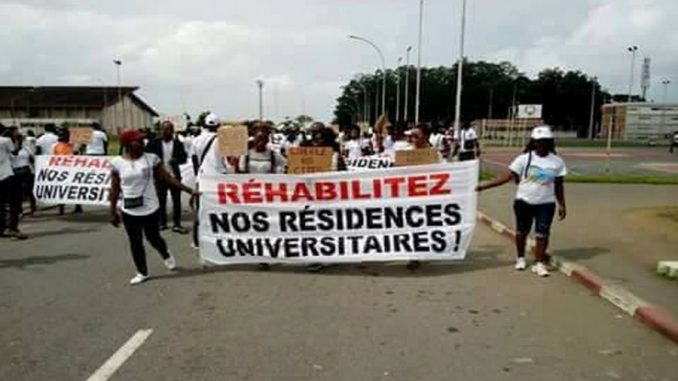
President Alassane Dramane Ouattara (ADO) has been in power in Côte d’Ivoire for the last 8 years. During the presidential election campaign of 2010, he promised an improvement in the social conditions of the country’s most disadvantaged sections of the population through his slogan “ADO SOLUTIONS”. With regard to education, he announced that he would be committed once elected to build schools and universities, equip them with teaching materials and introduce free education from preschool to third grade. He had also promised free healthcare for children and free maternity care.
Once in charge, instead of the promised solutions, Alassane Ouattara served up only illusions to his electorate. On the social level we have witnessed the chaotic evictions of shantytowns, small businesses and other sites without compensation or any means of support provided for the relocation of the evicted populations. The government has also no solution in relation to the phenomenon of the “microbes” – the pejorative term given to youth involved in violent gangs.
The Ivorian academic system is currently affected by several strikes, including that of the Student and School Federation of Côte d’Ivoire (FESCI), the largest student union, as well as that of the National Coordination of Research Teachers and Researchers of Côte d’Ivoire (CNEC), an important teachers’ union in public universities. Both unions have engaged in strikes in late May and June. The strike of the FESCI was motivated by the demand for the renovation of the university residences, because after the reopening of the university in 2012 following the post-electoral crisis of 2010, the government renovated only three. As a result, the students are forced to be crammed into rooms and even to sleep in amphitheatres and classrooms. The FESCI is also demanding access to Internet on the university site for students. As for the teachers, they have been protesting for payment of overtime work and for the resignation of Abou Karamoko, the president of the Felix Houphouët Boigny University, for his mismanagement.
After a General Assembly on Saturday 9 June, the FESCI decided to suspend its strike for a week, in order to allow the authorities to implement their promises. With regard to the CNEC, they have prolonged their strike until the 15th of June.
The social front is in turmoil through several other strikes in various sectors of the civil service since late May and running into June. These include the Ministry of the Interior, the Ministry of Agriculture, the Ministry of Foreign Affairs and the Directorate of Maritime and Port Affairs. At the Directorate of Maritime and Port Affairs, the strikers decided to occupy the premises in order to prevent non-strikers from working, and blocked all administrative vehicles.
The students of the National Institute of Youth and Sports, following the death of one of them as a result of a lack of medical assistance in the Institute’s infirmary, decided to block access to the Henry Konan Bédié bridge to demonstrate their anger. In the east-central town of M’Bahiakro, after the murder of a young student, students helped by the local population attacked the police, because their presence had been found futile and provocative. In Soubré, in the country’ south west, after there was a fire in the market, the mayor was summoned to leave the city before seeing his own house burned by the locals.
These events are not reflecting, as has sometimes been claimed, people’s ignorance of “good citizenship”; they rather indicate that the masses no longer trust the state and are willing to act to solve their own problems. This mistrust and defiance of the state is due to the fact that the government has not been able to achieve a single point of its initial programme, but still likes to make propaganda about its economic record, which only increases the hatred of the population against the state institutions. There is disenchantment among the peasant masses as well, with the drastic fall of the export of the country’s main products (cocoa, rubber, cashew nuts). Unemployment is skyrocketing and corruption plagues the public and private administration.
The ruling coalition is currently weakened, with the eagerness of the RDR (Ouattara’s party) to adhere to a project for a unified party with the PDCI (‘Parti Democratique de Côte d’Ivoire’, the RDR’s coalition partner) in the run-up to the next presidential elections in 2020. This partially reflects the fears of the ruling coalition because of the reawakening of the FPI -the ‘Front Populaire Ivoirien’. This is the party of ex-President Laurent Gbagbo, now detained by the International Criminal Court, which is trying to tap into the radicalisation of new generations with its call for a “nationalist revolution”. Other, pro-capitalist opposition parties have also gathered in a coalition called EDS (Together for Democracy and Sovereignty).
But youth and working people in Côte d’Ivoire will not find any salvation from any of these. A clear desire from an important section of the youth and working people is to break with the established parties. In a situation where people’s anger is only waiting for a detonator to explode, the task set upon itself by Militant Côte d’Ivoire (CWI in the country) to build a socialist alternative, is more urgent than ever.

Be the first to comment